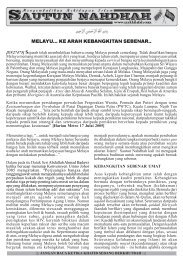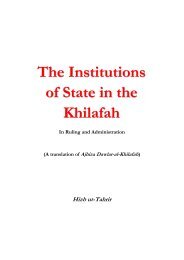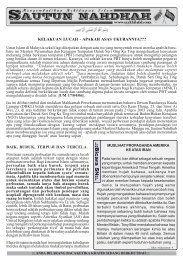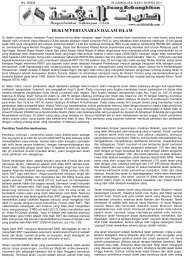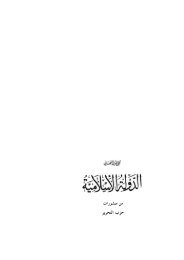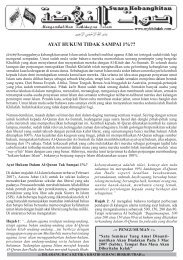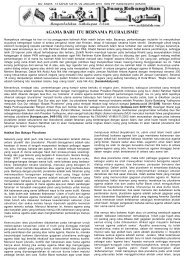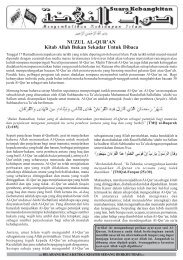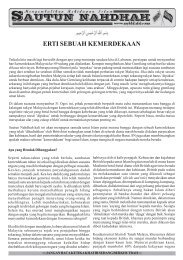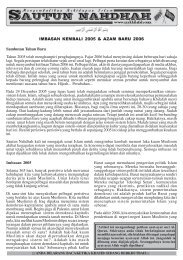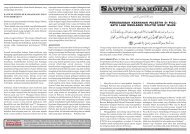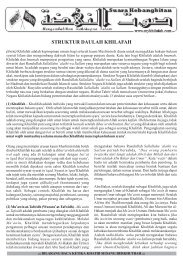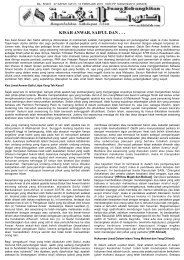A Warm Call from Hizb ut-Tahrir to the Muslims - MyKhilafah.com
A Warm Call from Hizb ut-Tahrir to the Muslims - MyKhilafah.com
A Warm Call from Hizb ut-Tahrir to the Muslims - MyKhilafah.com
Create successful ePaper yourself
Turn your PDF publications into a flip-book with our unique Google optimized e-Paper software.
62 u A <strong>Warm</strong> <strong>Call</strong> <strong>from</strong> <strong>Hizb</strong> <strong>ut</strong>-<strong>Tahrir</strong> <strong>to</strong> <strong>the</strong> <strong>Muslims</strong><br />
now say that <strong>the</strong> divine rule regarding <strong>the</strong> issue of insurance is that it is<br />
Haram and not allowed. This is because it is not abo<strong>ut</strong> joining a<br />
responsibility <strong>to</strong> ano<strong>the</strong>r responsibility, beside <strong>the</strong> insurance <strong>com</strong>pany<br />
did not join this responsibility <strong>to</strong> anybody; nor is <strong>the</strong>re a financial right<br />
<strong>to</strong> <strong>the</strong> guaranteed which <strong>the</strong> insurance <strong>com</strong>pany has pledged <strong>to</strong> anybody;<br />
<strong>the</strong>re is no guarantee for in this contract and it was made with<br />
<strong>com</strong>pensation (premium paid <strong>to</strong> <strong>the</strong> <strong>com</strong>pany). Thus <strong>the</strong> contract of<br />
insurance is void of all <strong>the</strong> Islamic conditions of guarantee stipulated by<br />
<strong>the</strong> Legisla<strong>to</strong>r and accordingly is invalid (Baatil). All invalid transactions<br />
are Haram and insurance falls in<strong>to</strong> this category. This is <strong>the</strong> Sharee’ah<br />
opinion regarding insurance, irrespective of whe<strong>the</strong>r it agrees with <strong>the</strong><br />
Capitalist viewpoint or not. The fact that <strong>the</strong> Sharee’ah is suitable <strong>to</strong> treat<br />
a problem in a particular era does not mean that it solves any such<br />
problem in accordance with <strong>the</strong> prevailing system of that era. Ra<strong>the</strong>r, it<br />
provides its opinion regarding such problems whatever <strong>the</strong> nature of<br />
<strong>the</strong> prevailing system of that time.<br />
Ano<strong>the</strong>r example is trade with o<strong>the</strong>r states. It is not correct <strong>to</strong> ask <strong>the</strong><br />
<strong>Muslims</strong> abo<strong>ut</strong> whe<strong>the</strong>r <strong>the</strong> Islamic view concerning foreign trade<br />
accepts <strong>the</strong> principle of freedom of exchange or protectionism, <strong>the</strong><br />
principle of a national economy or a policy of self-sufficiency. They<br />
ra<strong>the</strong>r should be asked abo<strong>ut</strong> <strong>the</strong> Islamic opinion concerning <strong>the</strong> issue of<br />
trade relations. The answer <strong>to</strong> this is what Allah said:<br />
"… Allah has permitted trading…" [TMQ Al-Baqarah: 275].<br />
He also said:<br />
"… except it be a trade amongst you, by m<strong>ut</strong>ual consent…" [TMQ An-Nisa:<br />
29].<br />
"…Save when it is a present trade which you carry o<strong>ut</strong> on <strong>the</strong> spot among<br />
yourselves…" [TMQ Al-Baqarah: 282].<br />
A <strong>Warm</strong> <strong>Call</strong> <strong>from</strong> <strong>Hizb</strong> <strong>ut</strong>-<strong>Tahrir</strong> <strong>to</strong> <strong>the</strong> <strong>Muslims</strong> u 63<br />
Thus Islam permits selling and trading, using a general wording text,<br />
whe<strong>the</strong>r inside <strong>the</strong> domain of <strong>the</strong> Islamic State or o<strong>ut</strong>side it. This<br />
includes everyone who is a citizen of <strong>the</strong> Islamic State, whe<strong>the</strong>r Muslim<br />
or non-Muslim. However, <strong>the</strong> one who does not hold <strong>the</strong> citizenship of<br />
<strong>the</strong> Islamic State is considered hostile as in <strong>the</strong> situation where <strong>the</strong>re is<br />
war between <strong>the</strong> <strong>Muslims</strong> and a state such as Israel; or considered hostile<br />
even when no state of war exists such as between <strong>the</strong> <strong>Muslims</strong> and a<br />
state such as Germany. An individual considered hostile is not permitted<br />
<strong>to</strong> enter <strong>the</strong> Islamic State unless he has been granted special permission<br />
for every visit he makes <strong>to</strong> <strong>the</strong> State, if <strong>the</strong>re is no treaty between <strong>the</strong><br />
State and <strong>the</strong> country of his origin. Where such a treaty exists, he would<br />
be permitted <strong>to</strong> enter <strong>the</strong> State according <strong>to</strong> <strong>the</strong> terms of <strong>the</strong> treaty. The<br />
rule regarding <strong>the</strong> hostile person applies both <strong>to</strong> him and his property.<br />
This means that it is permitted for <strong>the</strong> citizens of <strong>the</strong> Islamic State <strong>to</strong><br />
engage in foreign trade witho<strong>ut</strong> restriction, except in those <strong>com</strong>modities<br />
whose trade would cause harm <strong>to</strong> <strong>the</strong> State. Regarding <strong>the</strong> citizens of<br />
o<strong>the</strong>r states, <strong>the</strong> State has <strong>the</strong> right <strong>to</strong> impose those restrictions it sees as<br />
necessary, whe<strong>the</strong>r <strong>the</strong>re exist treaties or not, according <strong>to</strong> <strong>the</strong> rules<br />
regarding hostile people or peoples with whom a state of war exists. It<br />
should not be asked abo<strong>ut</strong> whe<strong>the</strong>r this opinion agrees with <strong>the</strong><br />
prevailing legislation in this particular era, b<strong>ut</strong> it should only be asked<br />
abo<strong>ut</strong> <strong>the</strong> opinion itself and <strong>the</strong> evidences it is derived <strong>from</strong>.<br />
The banks are ano<strong>the</strong>r example. It is not correct <strong>to</strong> ask <strong>the</strong> <strong>Muslims</strong><br />
abo<strong>ut</strong> whe<strong>the</strong>r Islam offers <strong>the</strong> same viewpoint as Capitalism regarding<br />
<strong>the</strong> banks and <strong>the</strong>ir organisation and <strong>the</strong> permissibility of allowing usury<br />
and interest. The <strong>Muslims</strong> must be asked abo<strong>ut</strong> <strong>the</strong> opinion of Islam<br />
regarding banks. The answer is that <strong>the</strong> reality of <strong>the</strong> current banking<br />
system is that it is based on usury in providing long-term and shortterm<br />
loans besides operating current account and credit facilities and<br />
so on. Regarding <strong>the</strong> transferring of funds and maintaining deposits or<br />
security, it is allowed <strong>to</strong> do so with or witho<strong>ut</strong> charging a fee. Regarding<br />
any transactions relating <strong>to</strong> usury, <strong>the</strong>se are definitely Haram. This is<br />
because Allah says:<br />
"…Whereas Allah has permitted trade and forbidden usury…" [TMQ Al-<br />
Baqarah: 275].<br />
1<br />
2<br />
3<br />
4<br />
5<br />
6<br />
7<br />
8<br />
9<br />
10<br />
11<br />
12<br />
13<br />
14<br />
15<br />
16<br />
17<br />
18<br />
19<br />
20<br />
21<br />
22<br />
23<br />
24<br />
25<br />
26<br />
27<br />
28<br />
29<br />
30<br />
31<br />
32<br />
33<br />
34<br />
35<br />
36<br />
37<br />
38<br />
39



